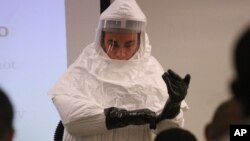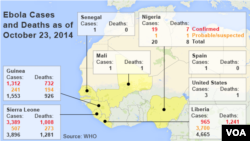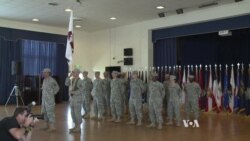The U.S. Centers for Disease Control has issued a new set of guidelines on how to handle health care workers returning from Ebola-affected countries of West Africa. The new guidelines come as the Obama administration clashes with state governments that have recently imposed quarantines on doctors and nurses who have been in Ebola zones.
White House spokesman Josh Earnest did not go as far as openly criticizing the governments of states like New York and New Jersey for requiring health workers coming from Ebola zones to be quarantined.
But he said any policy meant to protect Americans from Ebola should be based on science and should also consider the wider implications.
“We want to make sure that whatever policies are put in place in this country to protect the American public do not serve as a disincentive to doctors and nurses from this country volunteering to travel to West Africa to treat Ebola patients," said Earnest.
Earnest said people like Kaci Hickox are heroic. Hickox is the nurse who was quarantined in a tent by the U.S. state of New Jersey after she came back from working with Ebola patients in West Africa.
The case triggered outrage among some medical experts who criticized the measure as inhumane and unnecessary.
Meanwhile, a five-year-old boy in New York tested negative for Ebola after arriving from Guinea with a low-grade fever.
The Obama administration has resisted calls for a travel ban or quarantines, saying the measures would hinder efforts to fight the disease at its source in West Africa.
The guidelines released by the Centers for Disease Control and Prevention are only recommendations, and the federal government cannot force the states to adopt them.
Under U.S. law, federal authorities can detain, examine, and release people arriving in the U.S. who are suspected of carrying communicable diseases, but only the states have authority to enforce isolation and quarantine laws.
The question came up Monday on whether Samantha Power, the U.S. Ambassador to the United Nations, will be scrutinized upon her return after visiting Ebola-afflicted nations.
Officials said Power will abide by the health laws of the state in which she lands, but they noted she may not be subject to quarantine since she is not a health worker.
State Department spokeswoman Jen Psaki on Monday said Ambassador Power’s delegation did not have contact with people infected with Ebola.
“She is not visiting any Ebola treatment units. They are observing all hand-washing protocols and doing temperature screenings multiple times a day," said Psaki.
Soldiers prepare to deploy
The U.S. military has already provided hundreds of troops to help fight the spread of Ebola in West Africa, and this week another 22 are leaving their families and friends in Maryland to join that fight.
Members of the Army's 1st Area Medical Laboratory unit like to call themselves soldier scientists. Their commander, Colonel Patrick Garman, said his team is trained and ready for Liberia.
"We have a lot of young soldiers. This might be their first deployment. They're very excited. I think they feel confident in their abilities, and they really want to get over there and show what they can do and help the situation," said Garman.
Andi Cohoon, a medical lab specialist for the Army, said she's always wanted the chance to do humanitarian work. But, she added, leaving her family to fight a deadly disease will be hard.
"My mom is slightly worried, just like a mother should be, but more than that I think she's proud of me and I really thank her for all her support," said Cohoon.
Some of the unit will work in Monrovia, while other three-person teams will work in mobile laboratories set up across Liberia.
The unit will not work directly with infected Liberians, but they will have to wear full protective gear because the samples taken of local Liberians still could contain the disease.
Back in Maryland, Colonel Garman's family treasures their last days together before his deployment and hopes his return will come as soon as possible.
"Everybody hopes for sooner. If they end up home early, it will be a great celebration. If they don't, we know it's for a year, so it's just a mindset," said Kim Garman, the colonel’s wife.
They hope to pass the days apart with frequent Skype conversations. They say the mission of stopping Ebola is worth the sacrifice.
"If the U.S. Military, the U.S. Army in particular, can go in and help reduce or eliminate the spread, we're doing something for the whole world, and for the United States," said Col. Garman.
The unit's colors encased during the departure ceremony will not see the light of day until the team lands in Monrovia. Two of the soldiers leave Wednesday, while the other 20 will deploy for West Africa on Saturday morning.
Also Monday, Pentagon officials said a small number of U.S. army soldiers deployed to help West African nations fight Ebola were put under quarantine at a base in Italy. Officials said none of the soldiers are exhibiting symptoms and are being watched only as a precaution.
White House officials continue to say the likelihood of a widespread outbreak on U.S. soil is extremely low.
Watch video report from VOA's Carla Babb:
WHO: 82 being monitored for Ebola in Mali
Health workers are monitoring 82 people who had contact with a toddler who died of Ebola in Mali last week, but no new cases of the disease have yet been reported, World Health Organization spokesman Tarik Jasarevic said on Tuesday.
Three WHO officials are already in the country, having traveled to Mali a week ago to test its Ebola preparedness, and five more are arriving, Jasarevic said.
Mali became the sixth West African country to report a case of the disease, and health officials want to try to contain the virus before it can spread out of control.
The girl had traveled with her grandmother hundreds of kilometers by bus from Guinea via Mali's capital and was hospitalized in the western Malian town of Kayes on October 20, but died four days later.
WHO has said the girl already started showing symptoms including fever, vomiting and blood in her stools - and was therefore contagious - before being taken to Kayes.
Jasarevic said the 2-year-old girl's grandmother was “doing OK so far,” but the deadly disease can take up to 21 days to show up in a patient, so all the 82 contacts who have been traced, including 11 health workers, will continue to be monitored.
Diplomatic sources have expressed concern about the preparedness of Mali, one of the world's poorest countries, to contain an outbreak. Home to a large U.N. peacekeeping mission, the mostly Muslim country is still battling northern Islamist militants after a brief French-led war last year.
The possibility of setting up a treatment center in Kayes was being discussed, Jasarevic said, and 40 volunteers had been trained in contact tracing, which is considered one of the key defenses against the fast-spreading disease.
Material for this report came from Reuters.















